Why is soil important?
Let’s take a moment to break down the base of our gardens – soil! What goes on under the surface is very important to the health and happiness of your plants.
Soil – Its alive!
Now when we say soil, we don’t just mean plain old dirt. To keep it simple, soil is a living melting pot of organic matter, minerals, water, air, and microorganisms, that serves as a medium for plant and animal life.
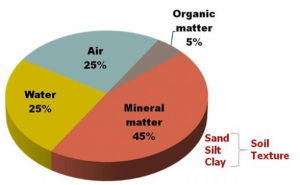
Soil Texture:
Let’s break down the texture of soil:
- Sand: Sand particles are large, coarse, and gritty. Great for improving drainage, so it does not hold water and nutrients.
- Silt: The smooth medium sized silt particles help to hold onto water and nutrients better, but don’t drain as well as sand.
- Clay: Very small silky particles that are known for their ability to retain water and nutrients and allow very little drainage.
The correct combination of these elements contributes to proper soil structure. Soil texture, or the way a soil feels, is important for things like water retention, nutrient availability, and the availability of air, called aeration.
Even though different prefer different structures, the right combination for your crops will improve your plant growth and health.
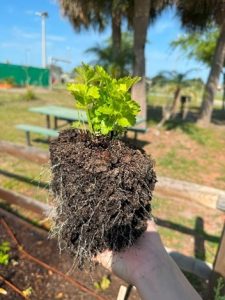
Composition:
The goal for all green thumbs is loamy soil – which is a balance of sand, silt, and clay. The texture is soft but supportive for plant roots and holds moisture and nutrients while allowing water to drain. Imagine it as a recipe for your favorite dessert, just enough of the right elements to create a perfect growing medium.
Most plants live in the uppermost layer of soil, or topsoil. This layer is the most nutrient dense and fertile, so plants extend their roots to access water, nutrients, and oxygen to thrive.
Soil amendments, what are they?
Amendments are important for maintaining the quality of soil. You may consider adding an amendment, or an addition, to improve or maintain your garden soil. Several factors of your soil including the pH of your soil, nutrient availability, soil structure, and health of beneficial microorganisms can benefit from an amendment. Soil amendments are applied or mixed into the topsoil to improve the soil’s properties to support plant growth. There are two main types of amendments: organic and inorganic.
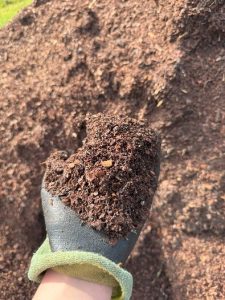
Organic Amendments
Organic matter: decomposed materials that help to improve soil moisture by retaining water and nutrients and introducing beneficial bacteria and microbes. Organic amendments include sphagnum moss/peat moss, coconut coir, wood chips, grass clippings, straw, compost, manure, biosolids, sawdust, and wood ash. Click here to read more!
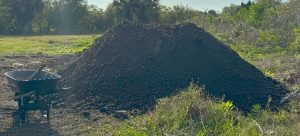
- Plant Manure: Yes, you read that right. This type of organic matter is made from decomposed plants.
- Compost: The process of piling up plants, kitchen scraps, yard waste, and other organic material and allowing it to decompose. Click here to learn more about making your own compost.
- Animal manure: Derived from animal waste products that provides nutrients, a source of organic fertilizer enhances the soil structure.
- Vermicompost: Utilizes worms to produce nutrient rich organic material that enhances soil health and promotes plant growth. Click here to read more.
- Cover crops: crops that are grown in an area to act as placeholders, and then incorporated into the soil as “green manure”. Click here to read more.
Inorganic Amendments
Inorganic amendments: materials that are mined or manufactured and added to soil to improve its composition. A few examples are s include vermiculite, perlite, pea gravel, and sand. Since the industrial production process has large environmental impacts, these substances are not as sustainable as organic amendments.
pH Adjusters
- Soil pH is a measure of how acidic your soil is, and it plays a significant role in the growth and survival of your plants. Just like how a balanced pH is essential for our bodies, plants also thrive when their soil pH is within the right range.
- Read our blog to learn more: Understanding Soil pH: The Key to Successful Gardening – UF/IFAS Extension Pasco County (ufl.edu)
The goal of adding amendments to your soil is to improve the environment in the soil for the best plant growth. Amending soil can increase nutrients, improve moisture retention, improve drainage, and much more.
Beware of over-amending your soil, which is a common problem. Do not add large quantities of amendment in a single season. This can cause a buildup of salts, nutrients, and water that could ultimately burn and kill your plants.
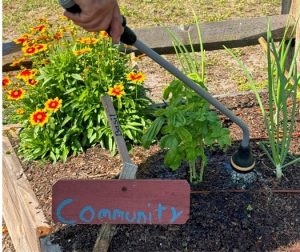
Factors to Consider When Choosing an Amendment
Adding these amendments can change the conditions of your soil, so consider the below before you amend it:
- soil texture
- how long the amendment will last in the soil
- salt content and pH of the amendment
- soil salinity and plant sensitivities to salts
Soil-less mediums
We can’t forget about the soil-less alternatives used in gardening and horticulture. These mediums are lightweight and well-draining, characteristics that keep plant roots happy. Since there is better control of moisture retention, some crops prefer these alternatives.
An example of these mediums are coco coir, perlite, and vermiculite- just to name a few. These alternatives are especially helpful for starting seeds, potted plants, and hydroponic systems. Another benefit is the lowered risk of disease and pests, an attractive characteristic when growing plants!
Where do I start?
Now that you’ve had the rundown, it might be overwhelming to think about where to begin. An excellent place to start is by getting your soil tested. The UF/IFAS Extension Soils Testing Laboratory offers affordable testing to the public. There are a variety of tests UF/IFAS Soils lab offers that detail the makeup of your soil.
This information will be useful when the time comes to choosing the crops you want to grow, applying fertilizer, and soil amendments to your garden.
Click here for a step-by-step guide on how to take a soil sample.

Tips for the Floridian gardener
Florida is known for beautiful sandy beaches and endearing flora. But this means Florida’s soil tends to be sandy. Remember, sandy soils do not hold water and nutrients very well. It is a good thing you know how to amend the soil to improve it!
On top of that, and the reason we don’t have basements, is the bedrock of limestone known as the Florida Platform. The calcium from this limestone leaches into the soil, increasing the pH, or making it more alkaline. Most plants prefer slightly acidic soils, since a pH of 5.5-6.5 allows for easier nutrient absorption. Keep in mind your desired goals and the potential impacts of amending your soil.
Want to read more? Click here to read more about soil pH, and what you can do to manage it.
Conclusion
Starting your gardening journey with the soil will create a strong base for your garden to grow. Learning how to enrich and maintain your soil is one of the most important things you can do to keep your garden flourishing. If you would like more information, contact our office. Happy gardening!
Supervising agent: Dr. Whitney Elmore County Extension Director, Urban Horticulture Agent, and Master Gardener Coordinator
Have a question?
If you have any questions about gardening in Central Florida, please contact the UF/IFAS Extension Pasco County at 352-518-0156. For more information on UF/IFAS Extension Pasco County Community Gardens, and how you can join one, visit http://sfyl.ifas.ufl.edu/pasco/.
Follow us!
We have several ways to connect. Visit our Facebook, Instagram, Eventbrite, Blogs, Florida-Friendly Facebook, Website
Read more from UF/IFAS Extension here:
Composting
- Composting for the Home Gardener
- Trash Talk: Alternatives to Traditional Composting
- Investing in Organic Matter for your Vegetable Garden
- ORGANIC VEGETABLE GARDENING IN FLORIDA
- Organic Soil Amendments
General Tips
- Vegetable Gardening in Florida Series
- Growing your groceries
- Florida Vegetable Gardening Guide
- UF/IFAS Extension Soils Testing Laboratory
 2
2
